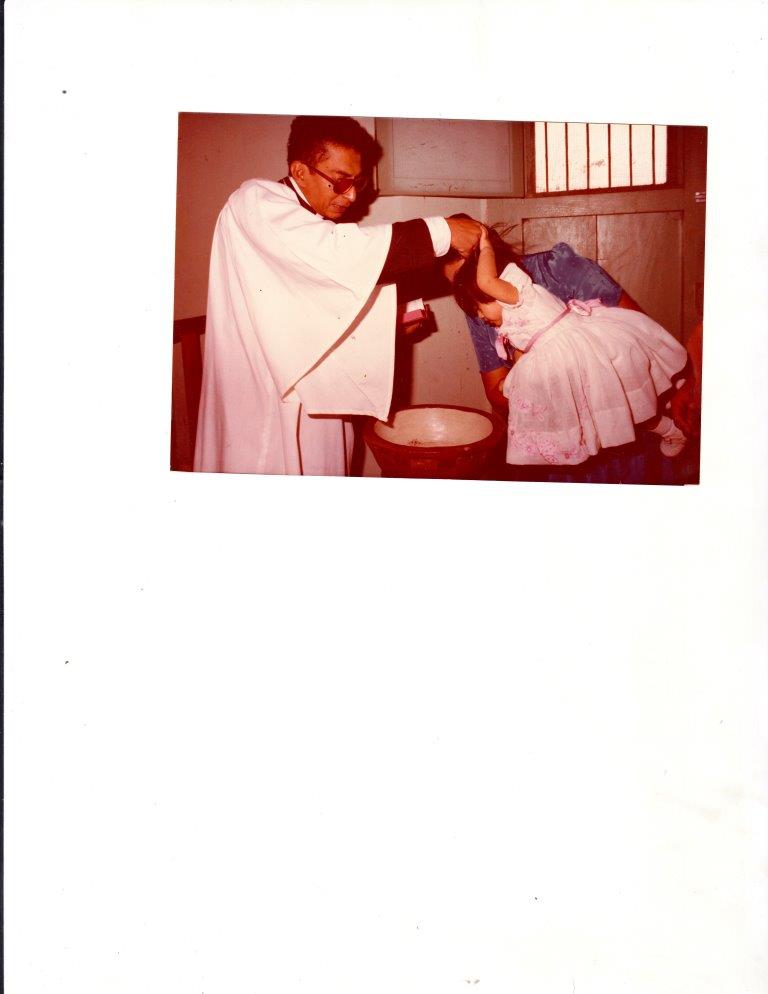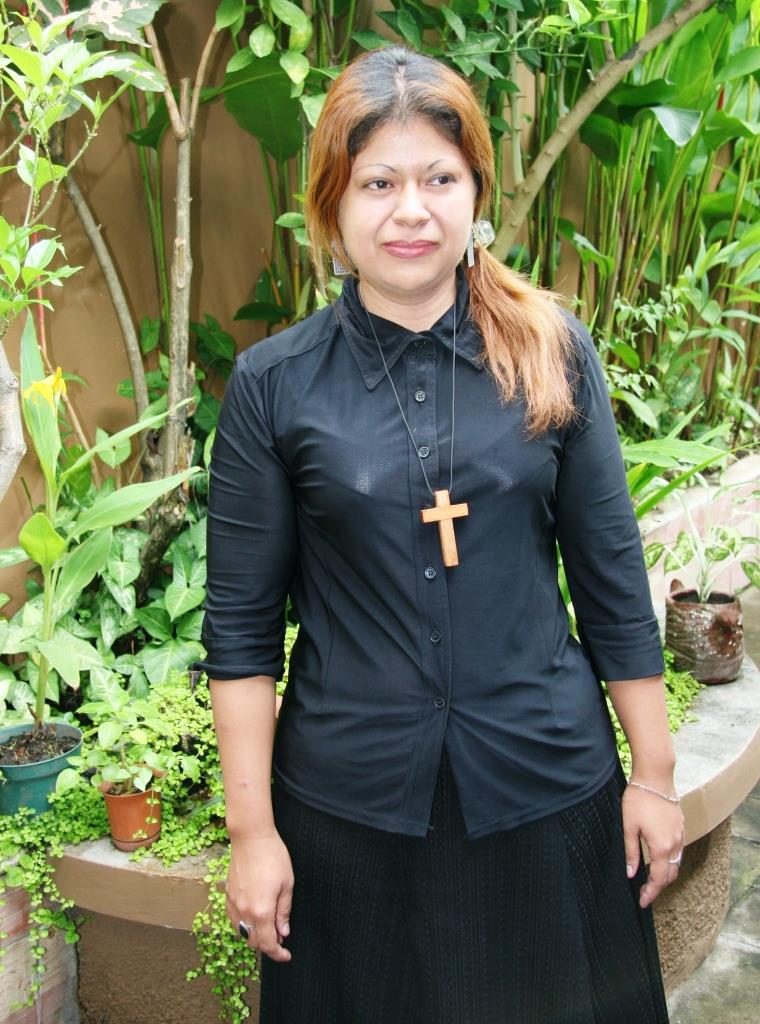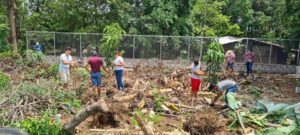Editor’s Note: This is a two-generation story of a father and daughter. David Fernandez, following in his father’s footsteps as a Lutheran pastor, was one of the martyred clergy during the country’s civil war. His daughter Belinda, only twelve when that horrific event happened, has come to terms with it and is following in her father’s and grandfather’s footsteps (as well as other family members) by serving in the same capacity in the same parish as her father.
Both Belinda and her mother,
Concepcion Aguilera da Fernandez, share David’s story. (In addition, several archived newspaper
accounts were verified for details of David’s death. These include The Boston Globe, Pittsburgh Press,
Palm Beach Post, and Washington Post all on November 23, 1984.)
DAVID FERNANDEZ ERNESTO ESPINO
“Christian, be there in the days – light and dark.”

DAVID’S STORY: David was literally born into a life of faith. The lineage for serving as Lutheran pastors is strong in our family. David’s father, Hector Mercedes Herrera, was one of the first in El Salvador. He died in 1974. David’s mother was Antonio Fernandez Espino. David was born in Barrio la Vega, San Salvador, on October 26, 1947. Being the son of a pastor, David was exposed to the needs of the people.
After completing his primary and secondary studies in San Salvador, David earned his Bachelor’s degree at the Lyceum in East San Miguel. By the time he was only twenty-three, David had developed a reputation within the missionary field as a catechist at the Lutheran Church of Santa Maria in the Usulutan department. Concepcion accompanied her husband to Mexico, where he studied and graduated with a degree in Theology from Augsburg Lutheran Seminary in Mexico City on June 21, 1975. [*It was here at seminary where David, as well as Medardo Gomez, who was also studying here from San Miguel, and Miguel Fernandez, were exposed to liberation theology from others in Latin America.]
When they returned to El Salvador, David delved into his ministry in the San Miguel with gusto. He started three congregations there: El Progresso, Divine Redeemer, and El Volcan. He also had responsibilities for three other congregations in the Usulutan department: Usulutan, Puerto Parada, and Santa Elena. Some of them were large congregations. Divine Redeemer, for example, was always overflowing with people, and we had to buy large speakers for the people to hear services unable to fit in the church who were gathered outside.
David had already discovered a niche in acquainting people with the gospel. He was an announcer on Radio San Miguel, Chaparrastique Radio, and Radio Minute. Using the popular mass media of the day, David was able to evangelize over the air at no cost and could reach many more people.
Having been raised in a home with strong Christian values that were constantly modeled by his parents, receiving formal religious training, and now being exposed to the numbers of people he was, David was ready to serve. Concepcion was always at his side and reports how badly he felt seeing people living in abject poverty and total misery. The people he found to be most needy were the displaced refugees in the conflict areas. The abysmal living conditions he saw people in were not worthy of human beings.
He especially had difficulty witnessing the suffering of the children who owned no clothes or shoes and were left to die of hunger. David found sponsors to support needy children and made certain that the children wrote letters of gratitude which he personally translated to those sponsors. He also wanted the children to have breakfast before they attended school each day so they would not pass out and would be able to learn. We searched for anyone willing to donate beans or rice for that purpose. It was these needs that propelled David into seeking humanitarian aid. He went to International World Vision for help.
Lutheran Academy Miguelena Pro-Improvement (ALPROMMI) was the organization David founded for the purposes of training low-income people in dressmaking as well as in health promotion. He had gotten a loan from Guatemala to start this business in order to provide employment.
Health care was another area of need. David asked each person to contribute just $1 so that by pooling our resources, we could employ doctors and nurses in a health care clinic. We worked together with the Red Cross.
Through the facilities at Divine Redeemer, David set up a distribution center to make available clothing, shoes, and food for displaced persons in need. He also started a vocational school in San Miguel.
David’s tragic demise began at 5 AM on Wednesday, November 21, 1984, when David was “escorted” away by two soldiers. His body was found badly tortured and brutally murdered in the village of El Progreso, 73 miles east of San Salvador. Someone had written on the back on his shirt, “Here ends Communism.” It was the shirt of the Atlacatl Battalion, a counter-insurgency group associated with death squads. David was thirty-seven years old.
Gone was the beloved servant David, appreciated by his colleagues and loved by the community for his generous and empathetic support. He was known as the “Shepherd for the poor.” We believe his death to be the result of his efforts to accompany his people. He saw injustices and tried to correct them.
Lutheran Bishop Medardo Gomez supported our family during the police investigation as well as long afterwards. There was an international presence, and the two representatives of the U.S. Embassy pressured the judge to make a decision. However, there were ongoing postponements. A large peasant union felt the courts made a mockery of this case. I asked people in my community to please not show me photos of the two persons responsible for the crime. I did not want to know their names because I wanted no hate in my heart. I preferred to let the justice be decided by God.
Editor’s Note: Just as he was born into a life of faith, so also David’s death was a testimony to his faith. He continued to serve those he felt to be in need throughout his short life. In so doing, he brought many people into the Lutheran faith. [Note: David’s brother Hector has served as president of Lutherano University in San Salvador. His nephew, Miguel, has served as pastor at Divine Redeemer.]
BELINDA CONCHITA FERNANDEZ AGUILERA
“Reconciling myself with God brought such peace and joy in my life.”
BELINDA’S STORY: Growing up in San Miguel with parents, my brother David, and my sisters Cynthia and Elizabeth, I had a good childhood. I was born on June 29, 1972. I spent my first twelve years in San Miguel attending Divine Redeemer, where my father was pastor. That all changed on November 21, 1984, the day my father was killed. My world was suddenly shattered, and our family constellation collapsed without him. We moved to San Salvador after the Peace Accords in 1992. Losing my dad and losing my close friends all within a few years’ time were tough to accept.

Although I continued to attend worship services in church, it was only out of obligation to my mother, who insisted that I do so after my dad was killed. I felt that God did not love me because he took away my father. I was angry with God for a very long time. I refused to talk to anyone about my feelings. Eventually I felt the blinders were removed from my eyes, and I began to realize that it was not God’s wish that my father died, but humans’. Bishop Gomez was so helpful and became like a father to me. I found he always had the right words at the right times and provided solidarity to me, and I thank God for that. He supported all my siblings through our grief and throughout the entire civil war.
Reconciling myself with God brought such peace and joy in my life. I had always planned on being a secretary and did indeed serve as the bishop’s secretary for eight years. Then five years ago, I found myself wanting to discover more about the gospel and God. I asked the bishop for permission to attend his weekly pastors’ meetings to help me learn. He steered me in another direction saying if I wanted to learn about theology, it would be better for me to study it at the university. I am now nearly finished with my degree.
When Divine Redeemer lost its pastor, the bishop asked me if I would take that call to serve as the lay pastor. I never imagined I would be called to serve in the same church as my dad. It seems such a big coincidence. I asked my mom for her opinion of what to do. Her first reaction having been an extremely busy pastor’s wife for many years was “No, don’t be a pastor. It’s a big responsibility and a great deal of work. But on reconsideration, it is your decision and I encourage my children to make their own decisions.” I think my dad would be very proud to know I am serving in his church.
There were many situations I was unaware of and, truth be told, when I walked in the door of the church and discovered some of them, I was about ready to turn around and walk out. However, I knew that God has a reason for me to be serving in that position. And I also learned quickly that there are people to assist you and get you through the rough spots. I know they will improve. God is helping me sustain my faith by taking one step at a time through times of discouragement.
The areas of ministry that I most enjoy are being active in women’s rights, visiting the sick and working with the youth. I also enjoy teaching, and I volunteer in the local schools. Areas of ministry that I struggle with are going into the jails and being taken seriously, perhaps because of my youth. I do see some improvement in that since I began, though, and people are more welcoming, are attending worship, and are starting to come seek counsel. Perhaps having lived through the tragedy of losing my dad and my struggling with my faith during that grief will make me a better listener and provide more insight to those persons in my congregation who have to face loss. I am studying psychology and combining that with my pastoral work and experience. Another positive sign is people are volunteering to help with the liturgy and with programs such as Vacation Church School. There is a group that is dedicated to selling something every week to help subsidize our ministries. Now that I’m getting better acquainted with the families, I’m trying to illustrate their personal situations into my sermons.
The bakery remains an important ministry of our church for two reasons. It helps support the church financially, and it helps teach skills to people within the congregation. Many new people are approaching me asking to learn these skills.
Bishop Gomez continues to serve as my pastoral mentor for advice. Sometimes when I feel ill-equipped to handle a specific situation, he will help me problem solve it. I know to make certain that funds from sister congregations are very transparent. My secretarial skills should be helpful. I also want to be sure that scholarship recipients express their gratitude for financial support to those who offer it.
I am unmarried and live in the church’s attached parsonage with my extended family of mother, siblings, and nephews. I don’t have time for many hobbies, but I enjoy watching TV and listening to music. I try to listen to new hymns so that I can teach the congregation because they follow me when I sing. Years ago I used to sing in the church choir. I would like to learn to play the guitar.
My next big challenge and personal goal is to graduate from Lutherano University next year and then take my test. My goal for our congregation is to strengthen it. Many former members are beginning to return. My hope for our country is to promote human rights by going to different communities to make human rights “makers.” I have seen problems when people have legal issues and don’t know how to proceed in dealing with them. I would like to accompany them in working through issues such as this.
Editor’s Note: Belinda clearly has the needs of the people
she serves at heart just as her father did a generation ago. Although the specifics of those needs differ,
a gospel-oriented dignity of the person centers her. I sincerely hope that Belinda is permitted a
much longer tenure of service than her father was allowed. For just beginning a call to ministry, she
sure has an impressive focus, not to mention her pedigree.


